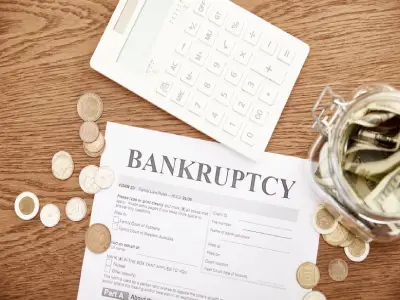What Bankruptcy Can and Cannot Do
Bankruptcy Attorney in Royal Oak, MI
What usually comes to mind when you hear the word “bankrupt”? It would automatically alarm some as that is often associated with people who have financial problems and are awash in credit card debt due to poor decisions. This may be the case for others, but different people have different circumstances.
Though borrowing money is normally done with the intention (and income capability) of paying it back, you may find yourself unable to keep up with payments. Those can be due to unexpected and unforeseen expenses like accidents and grave illness, on top of your daily, weekly, and monthly living expenses. Fortunately, the attorneys at Hammerschmidt Stickradt & Associates are professionals in helping their clients with debt relief and educating them on what bankruptcy can and cannot do in Michigan.
Hammerschmidt Stickradt & Associates specializes in bankruptcy law services and offers payment plans for all budgets, including a free credit rebuilding program. Their Oakland county bankruptcy attorneys will walk you through everything about bankruptcy, debt relief, and other practice areas.
Do you need to know what can bankruptcy do to help you in Michigan? Schedule your free consultation and get good legal advice from our bankruptcy attorney!
Why Do I Need a Bankruptcy Attorney in Michigan?

We also believe that a competent bankruptcy relief attorney upholds good moral values while also:
- Displaying strong integrity and work ethic in everything they do
- Treating all people with consideration and respect while giving excellent legal services
- Taking an active role in making the community a better overall place, and
- Communicating and creating mutual understanding with all their dealings.
Not sure of what your next move should be? Avail of Hammerschmidt Stickradt & Associates’ free consultation to get an idea of what bankruptcy can and cannot do in Michigan.
What is Bankruptcy?
By definition, bankruptcy is a federal legal process made to ease the financial problems caused by large amounts of debt to an individual.
According to the United States Bankruptcy code, there are five chapters to choose from when filing for bankruptcy, depending on your situation or source of income. These include:
- Chapter 7 – Liquidation
- Chapter 9 – Municipality
- Chapter 11 – Business reorganization
- Chapter 1 – Family farmer reorganization
- Chapter 13 – Consumer reorganization
Regardless of what chapter you choose to file, all individuals are required to complete a credit counseling course within 180 days before filing. You are also required to take a debtor education course after filing before your debts can be discharged. This is to further educate you about what bankruptcy can and cannot do in Michigan, and more information can be found here.
Hammerschmidt Stickradt & Associates specializes in assisting you when filing for Chapter 7 bankruptcy and Chapter 13 bankruptcy, which are further explained below.
What is Chapter 7 Bankruptcy?
Also known as liquidation, Chapter 7 bankruptcy is where a bankruptcy trustee may seize or sell some of your assets to help pay back some of what you owe. In return, most or all of your debt, for which collateral hasn’t been pledged, will be erased. Fortunately, not all property will be taken. You are allowed to keep those protected by bankruptcy exemption under state law, such as your car, clothes, and social security. Chapter 7 bankruptcy usually lasts for 3 to 6 months after filing.
To be eligible in filing for Chapter 7 bankruptcy, the individual, partnership, corporation, or business should appear before the bankruptcy court and follow any given orders 180 days before the bankruptcy petition. You must also have received counseling from an approved credit counseling agency within 180 days before filing unless you are qualified for an exception. Additionally, you need to pass a means test and a totality of the circumstances test to see if your current situation qualifies you for Chapter 7 bankruptcy case filing.
Get in touch with an Oakland county bankruptcy attorney today to know more about what can bankruptcy do in Michigan if filed under Chapter 7.
What is Chapter 13 Bankruptcy?
Also known as consumer reorganization, Chapter 13 bankruptcy involves being able to keep all of your property as long as you make monthly payments to each creditor within 3 to 5 years. Having a reliable source of income is a must when filing for Chapter 13 bankruptcy, as it provides you with a better opportunity to pay your debts on time. The minimum amount you need to pay will be determined by how much you earn, how much you owe, and how much every unsecured creditor would have received if you chose to file for Chapter 7 bankruptcy.
To be eligible in filing for Chapter 13 bankruptcy, the individual should appear before the bankruptcy court and follow any orders given 180 days before the bankruptcy petition. You must also have received counseling from an approved credit counseling agency within 180 days before filing unless you are qualified for an exception. In addition, an individual who is self-employed or running an unincorporated business is still eligible for Chapter 13 bankruptcy, provided that the sum of secured and unsecured debts is less than $2,750,000 as of the filing date.
Reach out to a Michigan bankruptcy attorney and get the information you need on what can bankruptcy do in Michigan if filed under Chapter 13.
How Do I File for Bankruptcy in Michigan?
To file for a bankruptcy case in Michigan, it is best done alongside an attorney who will fully evaluate your claim to help give you the best possible outcome. Our attorneys at Hammerschmidt Stickradt & Associates know exactly what bankruptcy can and cannot do in Michigan and will walk you through the entire process.
What Can Bankruptcy Do in Michigan? Find Out Now!
Filing for Chapter 7 or Chapter 13 bankruptcy can help erase certain debts you have in credit cards, loans, and medical bills. However, bankruptcy does not wipe out several types of debts like child support, spousal obligations, and most of what you owe in taxes. That is why every attorney at Hammerschmidt Stickradt & Associates delivers quality legal assistance to help you overcome your financial problems and be financially free!
Besides educating you on what bankruptcy can and cannot do in Michigan, we also offer legal services for the following areas of practice:
- Automatic Stay in Bankruptcy
- Abusive Creditors
- Credit Card Debt
- Student Loan Debt
- Stop Foreclosure
- Wage Garnishment
Call us and avail of our free consultation. We’ll be happy to help in any way we can!

